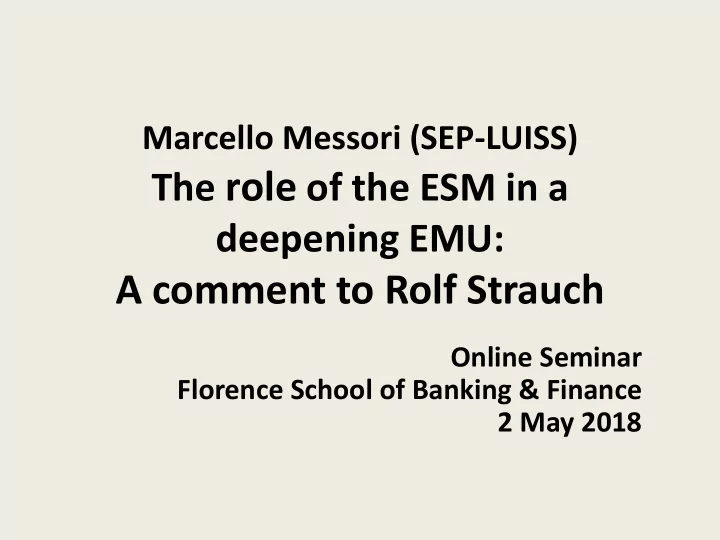

Marcello Messori (SEP-LUISS) The role of the ESM in a deepening EMU: A comment to Rolf Strauch Online Seminar Florence School of Banking & Finance 2 May 2018
Outline • Rolf Strauch’s presentation a number of stimulating suggestions: (a) R ole of ESM as ‘lender of last resort’; (b) EZ ‘Aid programs’ positive re-adjustments in the five countries involved; (c) Remaining open problems in the EMU; (d) Deepening EMU and strengthening ESM. • My comment will focus on: - Firstly, two general points by (d) = ‘Sovereign Debt Restructuring Framework’ + EDIS ; - Then, specific point by (c) = risk sharing in the EZ.
1. EDIS • Strauch’s thesis: EDIS implementation = after banks’ solution of their “legacy issues” and banks’ “de - risking”. • My thesis: - Full EDIS reduction in the amount of NPLs + reduction in the national idiosyncratic regimes in BU’s second pillar (transition process); - reduction in large exposures introduction of a ‘safe asset’ (buffer to banks’ potential losses + stabilization of sovereign debt in EZ periphery); - ESBies = no ‘safe asset’, hence ESM involvement.
2. SDRF • Strauch’s thesis: Sovereign Debt Restructuring Framework (SDR) = to create a predictable (that is, an ex ante ) Private Sector Involvement (PSI). • My thesis: - Ex ante sovereign debt restructuring quasi-automatic PSI in case of aid programs increase in macroeconomic instability as well as in redenomination risk (Deauville scheme); - Alternative possible solution: ex ante binding commitment + ex post possible SDR; - Case of Italy MTO rule + ESM intervention to match the approach to MTO and the ‘Debt rule’.
3. Risk sharing • Strauch’s thesis: “to promote risk sharing” completion of the Banking Union and strengthening of ESM. Hence: - no need of a centralized fiscal capacity; - EMU does not need a Fiscal Union. • My thesis: Strauch’s Fig. in Slide 10 tells an opposite story = main failure in EMU’s risk sharing largely by Fiscal policy (worst performer) and not by Credit market (best performer).
Recommend
More recommend